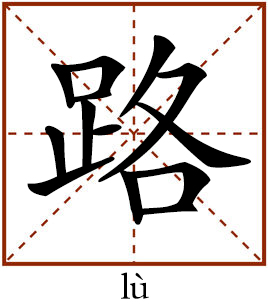Road

This character has the general concept of way, road or path. It can also be used for the abstract concept of opportunity or chance.
筚路蓝缕
bì lù lán lǚ
Bi lu refers to a simple and crude cart used to carry firewood or cleaning trail in a jungle. Lan lü is often associated with tattered, torn and ragged clothes. The proverb literally refers to people in ragged clothes pushing crude carts. It depicts the image of a pioneer opening up virgin lands.
This proverb first appeared in the Zuo Zhuan, or the Commentary of Zuo, an ancient Chinese narrative history that is traditionally regarded as a commentary on the ancient Chinese chronicle Spring and Autumn Annals. The proverb is derived from the founding of the state of Chu during the Zhou Dynasty (1046–256 BCE). After the Zhou overthrows the Shang Dynasty, King Cheng of Zhou (c. 1042–1021 BCE) awards Xiong Yi, a vassal lord of the Zhou, with the fiefdom of Chu. In a meeting summoned by King Cheng, Xiong Yi is treated unfairly and is despised by the royal family, despite his ancestors’ loyal service to the former kings of Zhou. He returns to the Chu angrily and decides to develop the Chu into a powerful state. He then begins the arduous task of clearing the thorny undergrowth from the foothills of the Jingshan Mountains so that his people could build Chu. After a series of administrative reforms, Chu becomes a successful expansionist state during the Spring and Autumn Period, and the rulers of Chu declare themselves kings on an equal footing with the Zhou kings.
In the story of Chu, the proverb is used to depict how the Chu people begin from nothing, reclaim wasteland and establish their homeland in harsh conditions. Today, it symbolizes the pioneering spirit, which coincides with a famous Chinese saying—“Thus, when Heaven is about to confer a great office on any man, it first exercises his mind with suffering, and his sinews and bones with toil. It exposes his body to hunger, and subjects him to extreme poverty. It confounds his undertakings. By all these methods it stimulates his mind, hardens his nature, and supplies his incompetence.”
edited by REN GUANHONG
